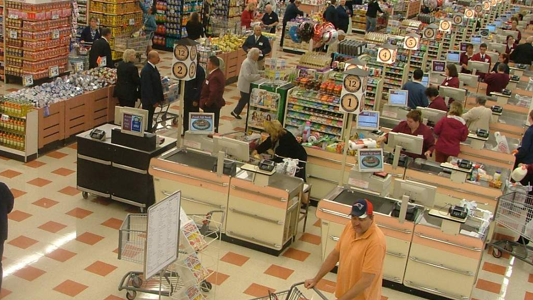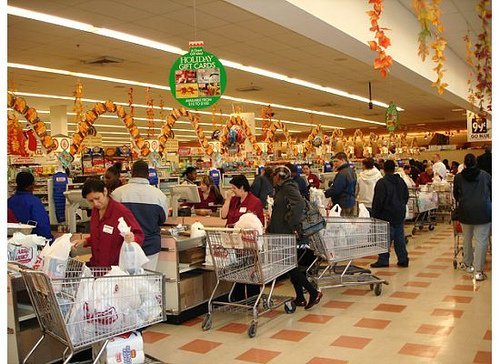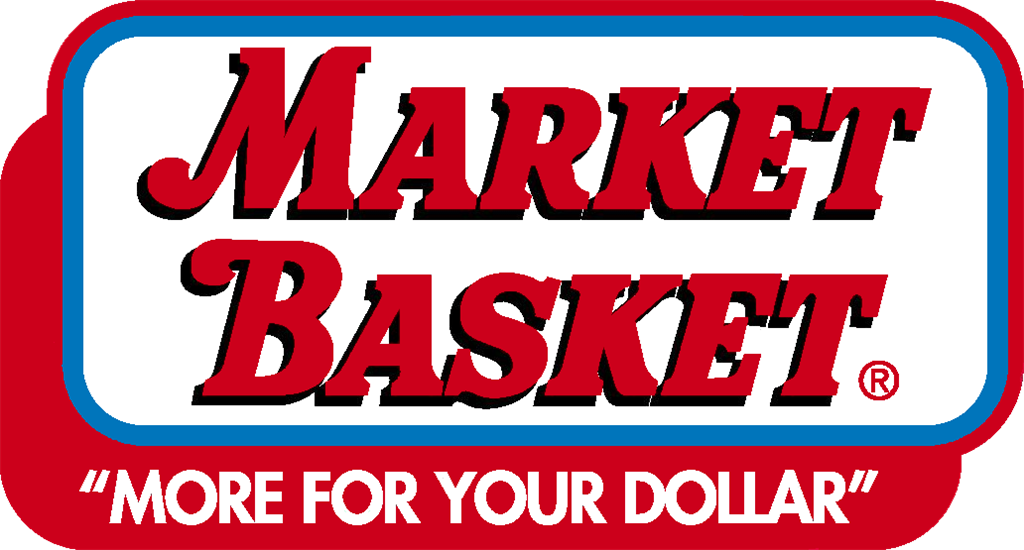Remember your first job? I do.
I started work at Demoulas Market Basket — a prominent grocery store in New Hampshire and Massachusetts — when I was 15, bagging groceries, pushing carts, etc,. When you work in the checkout (called “the front end”) you’re either a bagger, cashier, assistant front end manager, or front end manager. At Market Basket, most guys start out as baggers and most girls start out as cashiers. Market Basket is a first job for many and if you start out as a high school / college student, the furthest you can get promoted is to assistant front end manager, lovingly referred to as an “assistant.” They’re the teenagers in the checkout wearing blue coats with a set of keys around their wrists.
What’s interesting is that being an assistant front end manager is actually a great management training program. While standing at the front of a grocery store checkout holding a clipboard may seem mundane, it’s a daily task of resource management, strategic planning, time allocation, and conflict resolution.
A Typical Closing Shift at Market Basket
If you’re an assistant, you’re probably in class all day, therefore you’re likely working the closing shift, starting at 4:30, with the store closing at 9:00. Let’s set the landscape a bit, the number of registers varies in each store, but let’s go with a small store with only seven registers. When the assistant arrives, they immediately look at their schedule for the night to see how many cashiers and baggers are on. Here’s what they’re likely to see:
- Cashier A: 4:30-9:30
- Cashier B: 5:00-9:30
- Cashier C: 5:00-9:30
- Cashier D: 2:00-7:00
- Cashier E: 3:00-8:00
- Cashier F: 2:00-6:30
- Bagger A: 4:30-9:30
- Bagger B: 4:30-9:30
- Bagger C: 5:30-9:30
This is a typical closing lineup, these are your resources for the night (if you’re lucky, you might get a fourth bagger). With these nine people, an assistant needs to get all closing tasks done, while still doing the basic job of serving customers in the checkout. The store closes at 9:00 and the expectation is that all employees will be out of the store by 9:30, so everything needs to be done before that. This is your challenge.
Here’s the basic list of what needs to get done between 4:30 and 9:30… every. single. night.
- Breakdowns – Every aisle of the store needs to be broken down, sometimes known as “facing”, which means pulling the items forward on the shelf (in every aisle, on every shelf in the store). By closing, every aisle of the store should look perfect with at least two items pulled to front of the shelf and neatly aligned. When an assistant looks at a closing schedule they immediately dedicate at least one cashier to breakdowns for the night.
- Bathroom/Breakroom – Both need to be cleaned every night.
- Edge Out and Dry Mop – This is how the floor is prepped to be washed every night. A bagger will essentially sweep the entire store with a dry mop, using a regular broom to first “edge out” or sweep the hard-to-reach places a dry mop cannot reach.
- Floor Wash – Once the entire store has been dry mopped it’s time to begin floor wash, meaning a bagger maneuvers an industrial floor wash machine around the store. Timing is crucial here, floor wash takes about an hour to an hour and half (depending on store size); start the floor wash too early and the floors get dirty again before closing, start it too late and push back buffing (which happens next) and you toy with getting it finished after 9:30. Before the floor wash can begin, a bagger needs to change the brush pads on the washer and fill it with water, further adding to the time required to complete this task. Also, the floor washer is a million years old and is held together by coat hangers, so all baggers are well versed in consistently fixing the floor washer using whatever tools available. Additionally the washer needs to be emptied of all the dirty water and then needs to be hooked back up to the charger.
- Buff – Once the floor is dry mopped and washed, it’s now time to buff the floor. The buffer pad needs to be changed every night, and needs to be hooked up to the charger at the end of the night. Buffing the floor may be useless, it’s redeemable valuable is at the very least, subjective.
- Inside Dumps – Empty all trashcans inside the store, one at every register, plus the front doors, offices, etc.
- Outside Dumps – Empty all trashcans outside.
- Overstock – Throughout the day customers change their minds in the checkout and decide they no longer want that box of Frosted Flakes. But don’t worry they won’t put them back, they just say “I changed my mind on these Frosted Flakes.” Which is crazy right? Who doesn’t want Frosted Flakes? Anyhow, we call these items “overstock”, and throughout the day these overstock items are collected in a cart. When there’s a lull, a bagger or cashier will be charged with walking that overstock cart around the store and returning these orphaned items. Typically, the lucky person selected to put back overstock will aimlessly push the cart around the store and sometimes put things back…sometimes.
- Rugs – For my first several years at Market Basket, the checkout did not have a vacuum cleaner, so to clean the entry rugs required rolling them up, carrying them outside, and then sweeping (yes sweeping) the rugs off. Not kidding.
- Meat Case – You’ll be happy to know that every night the entire meat case “gets pulled.” A bagger is assigned to put all the meat in the display case on trays and then store it out back in the refrigerated meat room. A typical assignment of this task requires telling a bagger to go “pull the meat.”
- Ice Cream Covers – This is a weird one. Market Basket is a thrifty company, and by thrifty I mean that they don’t upgrade anything. This helps them keep prices low, but also makes a lot of their processes incredibly ancient. Anyhow, the ice cream in my store was kept in a freezer case that had no doors, making it very energy inefficient. At night, a bagger must place metal covers over the ice cream case to try conserve some of that energy overnight. Then first thing in the morning, the dairy manager removes all the covers and stores them out back.
- Ames Run – Each store probably has their own version of this, but if you worked at Storrs Street in Concord, NH then you know what this is. Once a night a bagger needs to take a walk around to surrounding stores (such as Ames — which moved out 15 years ago and is now Burlington Coat Factory) and find rogue carts (read: carts the homeless guys take).
- Kill drawers – The assistant needs to work closely with the Courtesy Booth ladies. They control the money and all they want is for the assistant to turn in all the drawers from their registers as soon as possible. The reason being, they have to count out every last penny of every last drawer before the night is over. Each cashier has a drawer, filled with money, and debit/credit slips, and coupons that need to be counted out and balanced. So the assistants can count of the Courtesy Booth incessantly calling and asking them to kill (turn in) drawers. But once the assistant kills the drawer that cashier can longer be open, so the assistant must strategically decrease their register resources throughout the night, without shooting themselves in the foot. You don’t want to kill too many drawers too early and then have a customer rush. Its been my belief that the Courtesy Booth staff secretly despises the front end staff, but that’s fine because the front end staff thinks the Courtesy Booth staff is pretentious.
But Wait, There’s More
While coordinating all these individual tasks, assistants still need to deal with:
- Carriages – Making sure a bagger keeps enough carriages in the store for customers, and keeps the parking lot clear of carts taking up parking spots.
- Red Baskets – Those hand baskets need to be constantly collected from the registers and brought back to the front door. They are also washed from time to time.
- Getting Lights – When a cashier has a problem they make their register light flash. Assistants then come and answer questions, make change, provide voids* (remove erroneous scans), and do “pickups” (collecting large amounts of money from each cashier in order to keep their register balance low).
- Customers – After 5:00 the Front End Manager goes home, so the assistants get to deal with any customer questions, complaints, special requests, etc.
- Employee Issues – Guess what? One of your closing cashiers called in sick and you need to replace them in the next 30 minutes or figure out how to do without them for the night. And another cashier wants to go home early. And don’t forget bagger A and bagger B both have a crush on the same cashier, so every chance they get they’ll neglect their responsibilities and go talk to her (and then they’ll probably fighter over her). Half the job is combating teenage hormones.
- Cut Hours to Make Budget – Inevitably at the end of the month, word will come down from the tower (at Market Baskets, the store manager’s office is always an open air tower above the Courtesy Booth) to cut hours from the schedule to make budget for the month. This seemingly always happens on Saturdays and it’s up to the assistant on duty to send people home early and cut people from the schedule entirely that day, while still keeping on enough resources run the checkout. Sometimes the cut requests are for 30 or 40 hours … in one day.
- Window Signs – Those huge signs in the windows change every week, on Saturday night. The assistant must make sure the new windows signs are assembled (they don’t come printed double-sided, so you need to staple them together) and posted in the windows (with shoddy poster hanging clips that never work so you need to tape them).
- Professional Floor Wash – Once a month a professional floor wash crew spends the night in the store and make the floors shine like you wouldn’t image 25-year-old orange floor tiles could. However, this means that everything needs to be picked up off the floor and stashed in the stock room…everything.
- Newspapers – You know those extra thick Sunday newspapers? They don’t come assembled. So when an assistant opens on a Sunday morning (at 6:30 am), they get the joyous task to putting together the various sections for all the Sunday newspapers.
- WIC Transactions -WIC stands for Women, Infants, and Children, and provides nutrition education and nutritious foods to help keep pregnant women, new mothers, infants and preschool children healthy and strong. When an order is paid for with a WIC voucher, the process is a bit complicated and usually requires an assistant to help process everything.
- Cigarette Inventory – About once a month the assistant is tasked with completing an inventory of the cigarettes. All the cigarettes. Every pack, carton, and case in the store. Typically one of the most reliable cashiers will get delegated this task.
- Checking Work – How are breakdowns looking? Did the bathrooms really get cleaned? Was the meat case pulled correctly? How’s floor wash going? Overstock? Rugs swept?
- Get out before 9:30 – Yep. Get everything done before 9:30. On ideal night, the assistant and the closing manager walk out together at or before 9:30.
All these things needs to get organized, prioritized, scheduled and done within five hours…every single night. Most assistants start at age 16.
This Is Legit Management Experience
This type of management experience and responsibility is invaluable. Market Basket may not fully appreciate what a great opportunity they provide to their front end assistant managers. Many assistants start in high school, and stay on all the way through their college years. By the time they graduate from college, they’ve been managing teams, resources, and customers for more than four or five years. Market Basket may well have developed one of the best management training programs in New England (for high school and college kids) without intending to. Talk about getting More For Your Dollar.
*A bit more on “voids.” When a cashier rings an item in twice they need to remove the extra scanned item. But for some reason, Market Basket does not grant cashiers permission to delete or void items. Therefore, every time this happens — and it happens a lot — the cashier needs to flip on their light and call for an assistant to “void” the item. The assistant needs to insert their keys into the register and type in a five digit code (every single time). This holds up lines and endlessly ties up the assistant’s attention. This seems to be an incredible waste of everyone’s time. Cashiers should be able to do self-voids. Cashiers should unite and start a petition. Also, the orange “paid” stickers are useless. #JustSayin #NoMoreVoids



